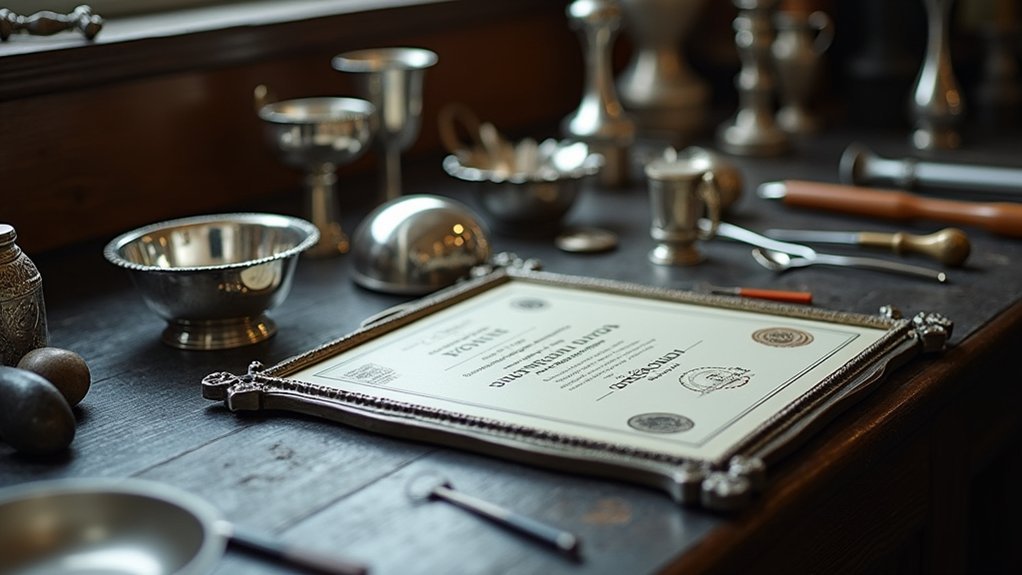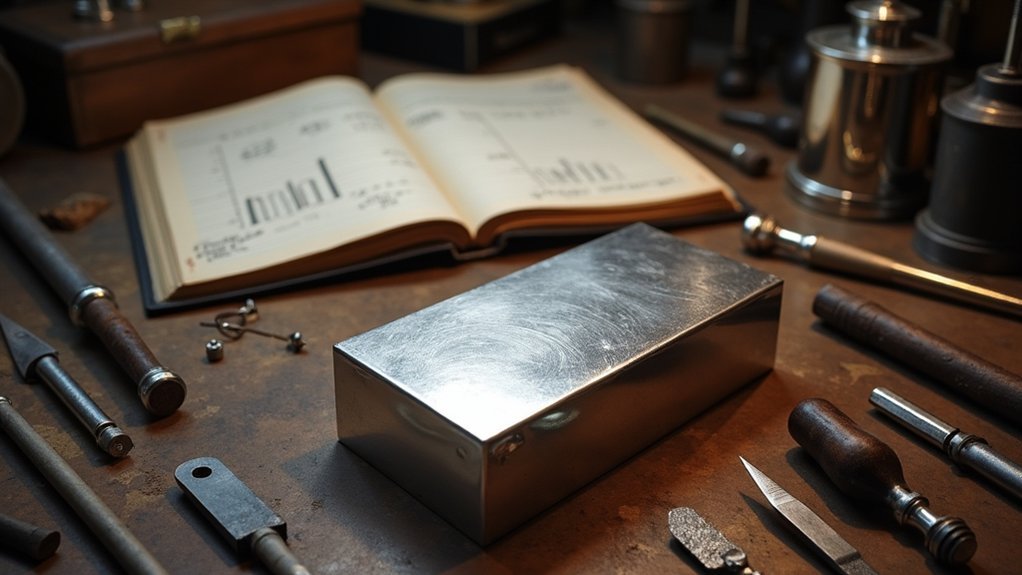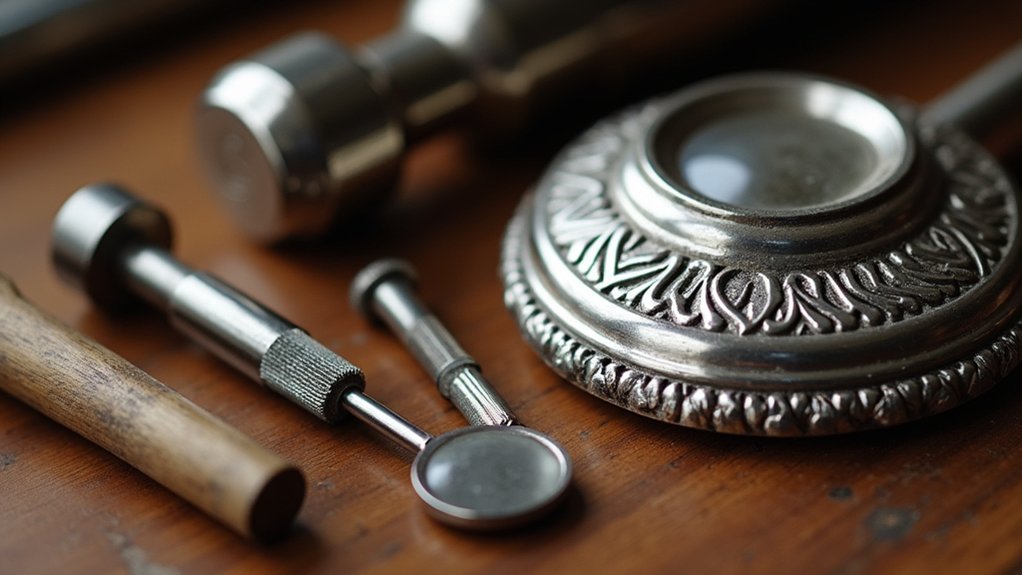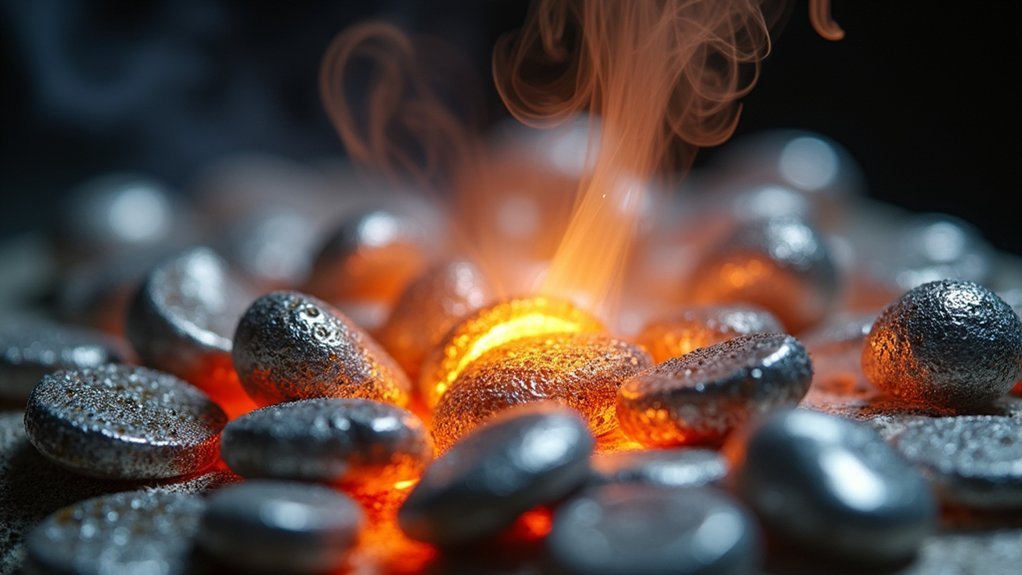You’ll need a combination of formal education, hands-on training, and professional certifications to become a qualified silversmith. Consider pursuing apprenticeships lasting 3-5 years, completing a Bachelor of Fine Arts or design degree, or attending focused trade school programs. You’ll also benefit from professional certifications like the Bench Professional Certification from Jewelers of America and specialized training in metalworking techniques, CAD software, and business management. Continue exploring to discover specific pathways that’ll accelerate your silversmithing career.
Essential Educational Pathways for Silversmithing Careers

While traditional university degrees aren’t always required, you’ll find several educational pathways that can launch your silversmithing career.
An apprenticeship offers invaluable practical training, typically lasting 3-5 years under experienced craftspeople. You can pursue a Bachelor of Fine Arts or Bachelor of Design, gaining foundational skills in metalworking and design techniques.
Trade schools provide focused programs ranging from 6 months to 2 years, teaching essential hands-on skills with tools and materials.
Continuous education remains vital for staying current with industry trends. You’ll benefit from specialized courses in areas like CAD for jewelry design.
Professional certification, particularly the Bench Professional Certification from Jewelers of America, enhances your career advancement opportunities while showcasing your skills to potential employers and clients.
Apprenticeship Programs and Hands-On Training Opportunities
Apprenticeship programs represent the most direct route into professional silversmithing, offering you structured learning that combines workshop experience with formal qualifications.
The Goldsmiths’ Company Apprenticeship provides thorough silversmithing training over 3-5 years, developing essential skills through hands-on training while earning vocational qualifications. You’ll start earning around £13,000, increasing to £18,000 as your skill development progresses.
Trailblazer Apprenticeships offer a modern 2-year alternative, focusing on level 3 qualifications in jewelry trades. You’ll need at least one year of prior work experience to qualify for these programs.
Organizations like the British Academy of Jewellery and City & Guilds expand your options with additional apprenticeships across the UK.
This practical training approach guarantees you’ll master traditional techniques while building professional credentials essential for silversmithing careers.
Professional Certifications and Industry Credentials

Professional certifications elevate your silversmithing credentials beyond apprenticeship training, establishing your expertise through rigorous testing and industry recognition. The Bench Professional Certification from Jewelers of America requires you to pass written exams and practical experience demonstrations, greatly enhancing your career advancement prospects.
The Goldsmiths’ Company offers thorough training programs and traditional apprenticeships that lead to recognized qualifications in silversmithing. You’ll gain access to specialized resources and networking opportunities through memberships in industry organizations, supporting your continuous professional development.
Consider pursuing skill-specific qualifications in gemmology, horology, or valuation to expand your expertise and marketability.
Regular participation in workshops and short courses keeps you current with evolving industry trends and techniques, further strengthening your professional credentials and competitive edge.
Technical Skills and Specialized Knowledge Requirements
Although certification provides industry recognition, mastering the technical skills forms the foundation of professional silversmithing expertise. You’ll need proficiency in metalworking techniques including soldering, shaping, and annealing silver. Design capabilities enable you to create custom pieces that meet client specifications precisely.
| Core Skills | Modern Tools | Growth Path |
|---|---|---|
| Soldering techniques | CAD software mastery | Workshops attendance |
| Metal shaping | Precision equipment | Apprenticeships completion |
| Understanding material properties | Digital design tools | Industry trends study |
| Annealing processes | Advanced machinery | Skill development courses |
| Custom fabrication | Technology integration | Continuous learning commitment |
Today’s silversmiths must blend traditional craftsmanship with modern technology. CAD software proficiency allows precise visualization and production planning. Understanding material properties guarantees durability and proper finishes. Continuous learning through workshops and apprenticeships keeps you current with evolving industry trends and emerging techniques.
Business Qualifications for Self-Employed Silversmiths

While technical mastery provides the foundation for quality craftsmanship, running a successful silversmithing business requires a completely different skill set. As a self-employed silversmith, you’ll need extensive business training covering marketing, bookkeeping, and management fundamentals.
A Bachelor of Fine Arts strengthens your design and craftsmanship foundation while building credibility with clients.
Consider pursuing Bench Professional Certification from Jewelers of America, which enhances your professional standing and marketing opportunities through rigorous written and practical assessments.
Financial management becomes vital when calculating overhead costs, pricing strategies, and budgeting for professional services.
Modern silversmithing increasingly demands proficiency in computer-aided design technology. CAD programs enable innovative designs and streamline production processes, giving you competitive advantages in today’s marketplace while expanding your creative possibilities.
Frequently Asked Questions
What Qualifications Do You Need to Be a Silversmith?
You’ll need a high school diploma or GED. Consider vocational training, apprenticeships, or foundation courses in goldsmithing. Professional certifications and continuous learning through workshops will enhance your silversmithing career prospects considerably.
Do Silversmiths Make Good Money?
You’ll earn moderate income as a silversmith. In the US, you can expect around $35,170 annually, while UK professionals make £22,000-£60,000. Self-employed silversmiths’ earnings vary considerably based on reputation and commissions.
What Skills Do You Need to Be a Silversmith?
You’ll need strong manual dexterity, creativity, and attention to detail for silversmithing. Problem-solving abilities help overcome design challenges, while interpersonal skills guarantee client satisfaction. CAD program knowledge is increasingly valuable for modern designs.
What Is a Silversmith Called Today?
You’ll find silversmiths today called metalsmiths, jewelers, or artisans, depending on their specialization. Some prefer titles like silver spinner or metal artist, while traditional craftspeople still embrace the classic silversmith designation.
In Summary
You’ll need a combination of formal education, hands-on training, and specialized skills to become a professional silversmith. Whether you pursue formal coursework, apprenticeships, or professional certifications, you’re building the foundation for success. Don’t forget that technical expertise alone isn’t enough—you’ll also need business skills if you’re planning to work independently. Your dedication to mastering both the craft and commercial aspects will determine your professional success.





Leave a Reply